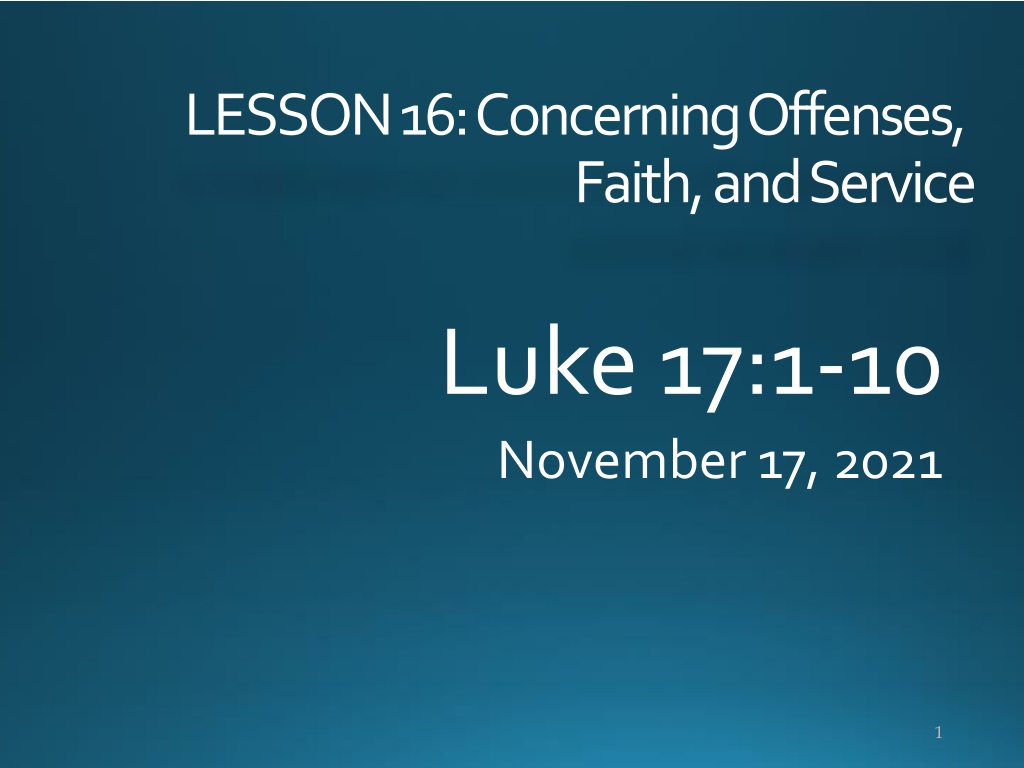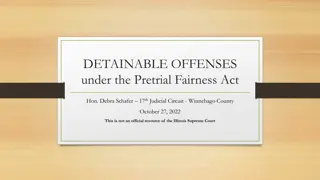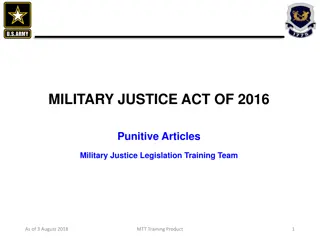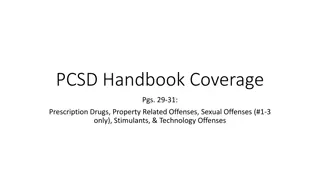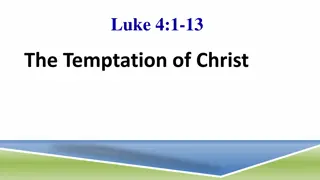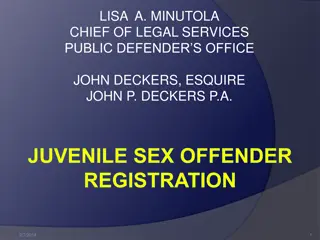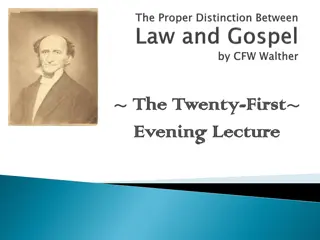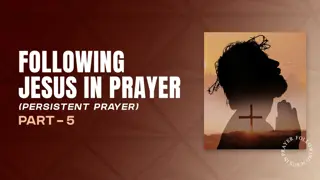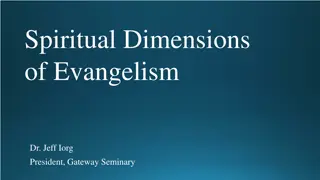Concerning Offenses, Faith, and Service in Luke 17:1-10
"Explore the concept of forgiveness in Luke 17:1-10, delving into the meaning, Greek origins, biblical examples, and the importance of forgiveness. Understand that forgiveness is a divine act that requires empathy, mercy, and a willingness to let go of resentment. Discover why forgiveness is essential for spiritual growth and the restoration of relationships, as exemplified through biblical teachings and the compassionate nature of God."
Download Presentation

Please find below an Image/Link to download the presentation.
The content on the website is provided AS IS for your information and personal use only. It may not be sold, licensed, or shared on other websites without obtaining consent from the author. Download presentation by click this link. If you encounter any issues during the download, it is possible that the publisher has removed the file from their server.
E N D
Presentation Transcript
LESSON 16: Concerning Offenses, Faith, and Service Luke 17:1-10 November 17, 2021 1
What Is Forgiveness? To excuse for a fault or an offense; pardon; To renounce anger or resentment against. To absolve from payment of (a debt as an example). (American Heritage Dictionary) 2
What Is Forgiveness? From two Greek words: apo (from); hiemi (send) to send away, to let go, give up a debt, to remit. (According to the Theological Greek Dictionary of the New Testament) Bible example is a scapegoat (carrying away). Leviticus 16:21; cf. Isaiah 53:4-6. A casting out Isaiah 38:17. A starting over Philippians 3:13,14. 3
What Is Forgiveness? Forgiveness is being like God... God removes the notation from the record Acts 3:19, Repent ye therefore, and turn again, that your sins may be blotted out. God forgets, putting out of memory Hebrews 8:12, For I will be merciful to their iniquities, And their sins will I remember no more. 4
What Is Forgiveness? Example of true forgiveness: The father forgave the prodigal son Luke 15:20-24. 5
Forgiveness Does Not Remove Temporal Consequences Convicted prodigal does not regain wasted money. Luke 15:13 Convicted murderer does not escape death penalty. Acts 25:11 Convicted thief does not escape due reward. Luke 23:40-43 Convicted adulterer not free to marry another or continue adultery. Matthew 19:9 6
Why Should I Forgive? God commands it. Mark 11:25, And whensoever ye stand praying, forgive, if ye have aught against any one The example of Christ demands it. Luke 23:34, Father forgive them, for they know not what they do. 7
Why Should I Forgive? We must forgive because we ourselves have been forgiven. Ephesians 4:32 Forgiveness is an act of mercy, not justice. Jesus said, Blessed are the merciful for they shall obtain mercy (Matthew. 5:7; cf. James 2:13) We must forgive in order that we may be forgiven. Matthew 6:14-15; Mark 11:25 God s estimate of an unforgiving spirit is found in Matthew 18:23-35. (text) 8
Why Should I Forgive? Seeking peace requires it! Romans 14:19 Love demands it. cf. 1 Corinthians 13:4 Love covereth a multitude of sins. 1 Peter 4:8 The Golden Rule demands it. Matthew 7:12 Forgiving others shows strength of character. Romans 12:17-21 9
Often Asked Questions About Forgiveness: Can the mind ever forget what others have done? Paul did not maintain a hate list. cf. 1 Corinthians 13:5, Love does not take account of evil We did when we were children We do as parents with our children We forget our own faults God says we can do both Ephesians 4:32. 10
Often Asked Questions About Forgiveness: Can the mind ever forget what others have done? Ephesians 4:32 Did God remember them? Hebrews 8:12; 10:17 If not, how did He inspire the writers to write about them? Did God forgive the fornicator in Corinth? After he repented we read, Sufficient to such a one is this punishment which was inflicted by the many; so that contrariwise ye should rather forgive him and comfort him, lest by any means such a one should be swallowed up with his overmuch sorrow (2 Corinthians 2:6-7).s This clearly implies that God had forgiven him, and that they were to do likewise, yet God remembered in the sense that He inspired Paul to write about it. There is a difference between forgiving and forgetting. 11
Often Asked Questions About Forgiveness: Can the mind ever forget what others have done? Ephesians 4:32 Did God remember them? Hebrews 8:12; 10:1-4, 17 This is evidently spoken after the manner of men, and in accordance with human apprehension. It cannot mean literally that God forgets that people are sinners, but it means that he treats them as if this were forgotten. Their sins are not charged upon them, and they are no more punished than if they had passed entirely out of the recollection. God treats them with just as much kindness, and regards them with as sincere affection, as if their sins ceased wholly to be remembered, or which is the same thing, as if they had never sinned. (Barnes Notes) 12
Often Asked Questions About Forgiveness: Can the mind ever forget what I have done? Saul of Tarsus was forgiven of his sins when he was baptized to wash away his sins (Acts 22:16), but he remembered his past sins when he wrote Timothy (1 Timothy 1:13-15; cf. Philippians 3:13). David was forgiven, yet he remembered his past sins. Nathan said, God hath put away thy sin (2 Samuel 12:13), but years later David wrote Psalms 32:1-5. The apostle Peter was pricked in the heart by the crowing of a rooster (Luke 22:61-62), and obviously repented of his sin. His life afterward shows clearly that he was aware of God s forgiveness, but no doubt the sound of a rooster crowing sent pains through his heart for a long time after that event. 13
Often Asked Questions About Forgiveness: How often must I forgive? Matthew 18:21-22; Luke 17:3-4. Not a matter of arithmetic but of love for my brother! We must forgive, if need be, seven times in one day or seventy times seven. Not just 490 times, but as often as he repents, I must be willing to forgive. 14
Often Asked Questions About Forgiveness: What if the offender does not ask for my forgiveness? Jesus on the cross. Luke 23:34 Did this give them forgiveness? Of course not conditioned upon their repentance! Acts 2:36-38; 1 John 1:9. One who does not repent, has no Godly sorrow for his sin. cf. 2Corinthians. 7:10 15
Often Asked Questions About Forgiveness: How should we forgive one another? Matthew 18:35, from the heart. Fully and completely (finality involved). The same as God in Christ forgives us. Ephesians 4:32 Jesus could, be touched by the feeling of our infirmities (Hebrews 4:15). 16
Often Asked Questions About Forgiveness: Barriers to Forgiveness. Bitterness. Physically, bitterness can lead to health and stress problems. Bitterness will destroy you! (cf. Ecclesiastes 8:14) Spiritually, it is a poison that can prove fatal to the Christian. Bitterness is a word associated with taste, but here it is used to accent a feeling. Bitterness can be overcome; the Bible never tells us to do the impossible ( put away ALL bitterness ). 17
